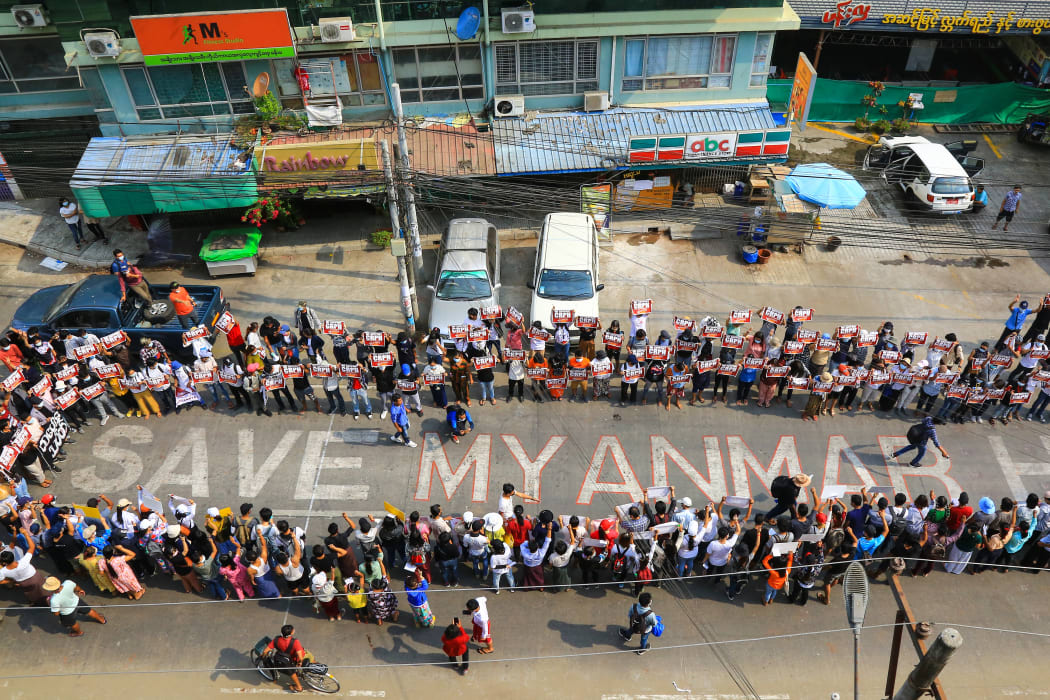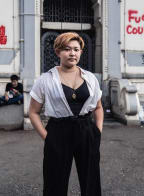On the 1 February Myanmar's military carried out a coup, seizing control of the country, undoing a democratic election in which Aung San Suu Kyi's National League for Democracy (NLD) party won by a landslide in the previous November.
In the weeks since, the Burmese people, including healthcare workers and civil servants have expressed their discontent through peaceful protest and mass civil disobedience.
Millions of workers have gone on strike with the hope of putting financial pressure on the military rulers.

Protesters taking part in a demonstration against the military coup in Yangon's Hlaing township. Photo: AFP
As of the end of March, at least 520 civilians, including children, have been killed by military or police forces and at least 3,070 people detained.
Aye Min Thant is a Pulitzer Prize-winning journalist who has covered business, politics, and conflict in Myanmar, Thailand, and the United States.
They most recently worked at Phandeeyar, a Yangon-based NGO, leading a team promoting social cohesion in Myanmar through digital and media literacy education.
She tells Kim Hill that, in the month leading up to the coup, there were grave concerns the military would stage a coup.
“The military since the election, and even before, and their proxy parties that align with them were voicing their concerns about voter suppression, about the ways in which Covid-19 restrictions could potentially suppress the votes even unintentionally.
“The military was making quite a lot of noise leading up to it about how they felt was unfair but, in the last week or so before the coup, they had seemed to back off a little bit on their claims.”
Thant says people were increasingly concerned about a coup, but a military spokesperson said they would obey the constitution and respect the will of the people.
“People interpreted that as them saying they wouldn’t go so far as to stage a coup but, clearly, that’s not what they meant, or they were lying.”
What the military’s intent was in staging the coup, or why exactly they did it, is still rather unclear, Thant says.
“Considering the mess that Myanmar is in now, it’s a little bit difficult to imagine what outcome they had expected when they staged this coup against an election in which 80 percent of the seats went towards one party and people seemed to be overwhelmingly supportive of the winning party.”
While Aung San Suu Kyi has come under fire for not doing anything to prevent, or perhaps even facilitating, the genocide against Rohingya Muslims, Thant says she is a revered figure in Myanmar.
“If you’re talking to Burmese people about her in Myanmar language, you’ll hear people call her ‘mother’, ‘the lady’, or ‘grandmother’. She’s really seen as a caring, maternal figure to the country and, even if one isn’t 100 percent aligned with her, one still needs to respect her and understand that she knows best essentially.
“In the early days of the coup, especially the first week or so, the people who were in the streets chanting were largely people who supported her specifically and her party… it took a few weeks for those chants and demands from protestors to shift towards ‘free our detained leaders’, ‘we want democracy’, ‘we want equality for everyone’.”
Kyi herself is a part of the majority Buddhist group in Myanmar and has suggested she wants Myanmar to be a Buddhist nation and culture.

Aye Min Thant Photo: supplied
“Now, that doesn’t mean that she necessarily thinks that other cultures should not exist or other religions shouldn’t exist, but that they occupy a space in Myanmar that is more akin to a ‘guest’ position as opposed to a fundamental part of the country.”
Thant says Kyi has made derogatory statements about the Rohingya and suggested that, if they properly assimilated, they wouldn’t be persecuted.
“In essence, she’s victim blaming a bit. But she hasn’t said, in any way, that she hates them.”
Thant says the west tend to valorise eastern leaders as being icons of democracy and the same thing was done to Ghandi.
“He, in reality, is a complicated person and there are questions about his racism, especially towards Africans and his questionable behaviours towards women in his life. Kyi has always been a complicated person and, in part, the west set itself up to be disappointed by her once she was free and able to actually act instead of being this beautiful women trapped by men with weapons.”
Thant believes Myanmar was on the right path to democracy and the leading party had always erred on the side of caution with the military.
“There’s more to democracy than simply being able to vote and many of the reforms people had hoped for with the introduction of civilian controlled government haven’t come to fruition and seemed like they would take quite a long time even if they were being discussed.
“What was surprising was that the NLD seemed completely unprepared for the potential of a coup. In the five years they have been in government, their response to many of the more progressive legislators and activists – who were pushing for more democratic change – has been that, if we move too fast the army can conduct a coup. The army’s ability to take over the government is embedded into the constitution that Myanmar had been under at the time.”
She says it’s bizarre that this is the excuse they used for the past five years but they seemed to have no contingency plans for if the military did actually stage a coup.
“Considering that there had been such grave concerns about a coup in the lead up to 1 February – the day the new government was meant to form – that essentially every elected official at the national level were gathered in the same place and were able to be arrested in one fell swoop. No one had any sort of plan to ensure they wouldn’t have been arrested or had some idea of how they might escape. It was very concerning and confusing.”
Since the coup, sanctions have been placed on Myanmar by the US and the EU and the EU Security Council could potentially intervene, but Thant says there’s limited options available.
“Short of military intervention, which is highly unlikely and probably not a good idea considering the delicate nature of the situation at the moment. An important role that the international community can play is in whether or not they choose to recognise the junta as the government of Myanmar.
“We’re seeing people begin to make that choice. The UK has accepted that the civilian appointed Myanmar ambassador to the UK is no longer recognised as such because they have received an official request from the military to remove that designation from him. This essentially recognises the junta as the government in Myanmar.”
Thant says that came as shock, particularly after the UK were vocal in condemning the military coup.
“It seems they are simply choosing to side with the military because it’s the path of least resistance as opposed to really making a stand and sticking by their principles of promoting democracy.”
She says China has a vested interest in having a neighbour that has a stable government and doesn’t risk creating a refugee crisis for them.
“But it’s difficult to say how these countries will act in the long run.”

